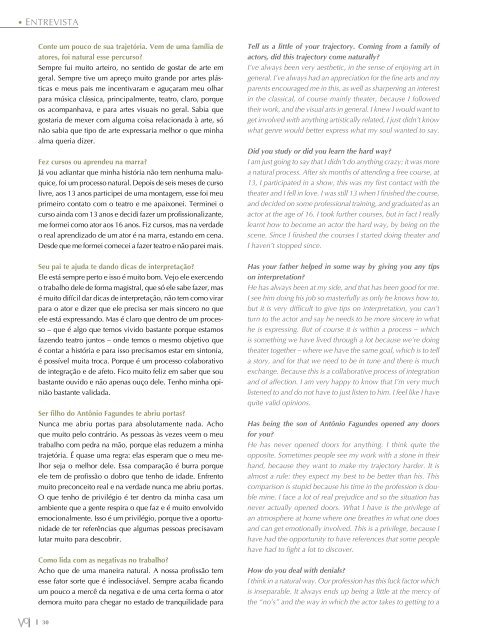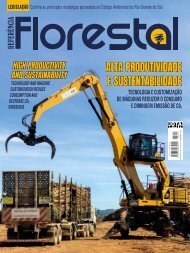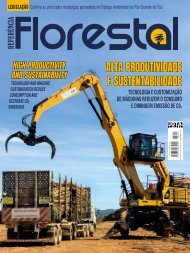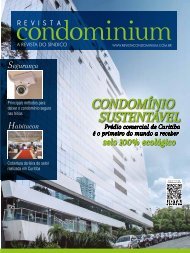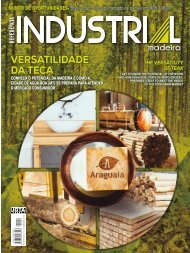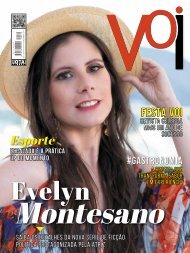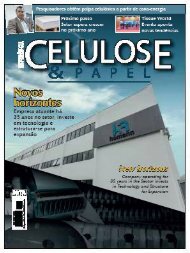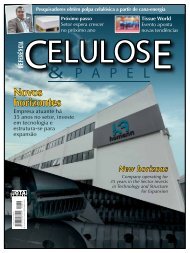You also want an ePaper? Increase the reach of your titles
YUMPU automatically turns print PDFs into web optimized ePapers that Google loves.
• ENTREVISTA<br />
Conte um pouco de sua trajetória. Vem de uma família de<br />
atores, foi natural esse percurso?<br />
Sempre fui muito arteiro, no sentido de gostar de arte em<br />
geral. Sempre tive um apreço muito grande por artes plásticas<br />
e meus pais me incentivaram e aguçaram meu olhar<br />
para música clássica, principalmente, teatro, claro, porque<br />
os acompanhava, e para artes visuais no geral. Sabia que<br />
gostaria de mexer com alguma coisa relacionada à arte, só<br />
não sabia que tipo de arte expressaria melhor o que minha<br />
alma queria dizer.<br />
Fez cursos ou aprendeu na marra?<br />
Já vou adiantar que minha história não tem nenhuma maluquice,<br />
foi um processo natural. Depois de seis meses de curso<br />
livre, aos 13 anos participei de uma montagem, esse foi meu<br />
primeiro contato com o teatro e me apaixonei. Terminei o<br />
curso ainda com 13 anos e decidi fazer um profissionalizante,<br />
me formei como ator aos 16 anos. Fiz cursos, mas na verdade<br />
o real aprendizado de um ator é na marra, estando em cena.<br />
Desde que me formei comecei a fazer teatro e não parei mais.<br />
Seu pai te ajuda te dando dicas de interpretação?<br />
Ele está sempre perto e isso é muito bom. Vejo ele exercendo<br />
o trabalho dele de forma magistral, que só ele sabe fazer, mas<br />
é muito difícil dar dicas de interpretação, não tem como virar<br />
para o ator e dizer que ele precisa ser mais sincero no que<br />
ele está expressando. Mas é claro que dentro de um processo<br />
– que é algo que temos vivido bastante porque estamos<br />
fazendo teatro juntos – onde temos o mesmo objetivo que<br />
é contar a história e para isso precisamos estar em sintonia,<br />
é possível muita troca. Porque é um processo colaborativo<br />
de integração e de afeto. Fico muito feliz em saber que sou<br />
bastante ouvido e não apenas ouço dele. Tenho minha opinião<br />
bastante validada.<br />
Ser filho do Antônio Fagundes te abriu portas?<br />
Nunca me abriu portas para absolutamente nada. Acho<br />
que muito pelo contrário. As pessoas às vezes veem o meu<br />
trabalho com pedra na mão, porque elas reduzem a minha<br />
trajetória. É quase uma regra: elas esperam que o meu melhor<br />
seja o melhor dele. Essa comparação é burra porque<br />
ele tem de profissão o dobro que tenho de idade. Enfrento<br />
muito preconceito real e na verdade nunca me abriu portas.<br />
O que tenho de privilégio é ter dentro da minha casa um<br />
ambiente que a gente respira o que faz e é muito envolvido<br />
emocionalmente. Isso é um privilégio, porque tive a oportunidade<br />
de ter referências que algumas pessoas precisavam<br />
lutar muito para descobrir.<br />
Como lida com as negativas no trabalho?<br />
Acho que de uma maneira natural. A nossa profissão tem<br />
esse fator sorte que é indissociável. Sempre acaba ficando<br />
um pouco a mercê da negativa e de uma certa forma o ator<br />
demora muito para chegar no estado de tranquilidade para<br />
Tell us a little of your trajectory. Coming from a family of<br />
actors, did this trajectory come naturally?<br />
I’ve always been very aesthetic, in the sense of enjoying art in<br />
general. I’ve always had an appreciation for the fine arts and my<br />
parents encouraged me in this, as well as sharpening an interest<br />
in the classical, of course mainly theater, because I followed<br />
their work, and the visual arts in general. I knew I would want to<br />
get involved with anything artistically related, I just didn’t know<br />
what genre would better express what my soul wanted to say.<br />
Did you study or did you learn the hard way?<br />
I am just going to say that I didn’t do anything crazy; it was more<br />
a natural process. After six months of attending a free course, at<br />
13, I participated in a show, this was my first contact with the<br />
theater and I fell in love. I was still 13 when I finished the course,<br />
and decided on some professional training, and graduated as an<br />
actor at the age of 16. I took further courses, but in fact I really<br />
learnt how to become an actor the hard way, by being on the<br />
scene. Since I finished the courses I started doing theater and<br />
I haven’t stopped since.<br />
Has your father helped in some way by giving you any tips<br />
on interpretation?<br />
He has always been at my side, and that has been good for me.<br />
I see him doing his job so masterfully as only he knows how to,<br />
but it is very difficult to give tips on interpretation, you can’t<br />
turn to the actor and say he needs to be more sincere in what<br />
he is expressing. But of course it is within a process – which<br />
is something we have lived through a lot because we’re doing<br />
theater together – where we have the same goal, which is to tell<br />
a story, and for that we need to be in tune and there is much<br />
exchange. Because this is a collaborative process of integration<br />
and of affection. I am very happy to know that I’m very much<br />
listened to and do not have to just listen to him. I feel like I have<br />
quite valid opinions.<br />
Has being the son of Antônio Fagundes opened any doors<br />
for you?<br />
He has never opened doors for anything. I think quite the<br />
opposite. Sometimes people see my work with a stone in their<br />
hand, because they want to make my trajectory harder. It is<br />
almost a rule: they expect my best to be better than his. This<br />
comparison is stupid because his time in the profession is double<br />
mine. I face a lot of real prejudice and so the situation has<br />
never actually opened doors. What I have is the privilege of<br />
an atmosphere at home where one breathes in what one does<br />
and can get emotionally involved. This is a privilege, because I<br />
have had the opportunity to have references that some people<br />
have had to fight a lot to discover.<br />
How do you deal with denials?<br />
I think in a natural way. Our profession has this luck factor which<br />
is inseparable. It always ends up being a little at the mercy of<br />
the “no’s” and the way in which the actor takes to getting to a<br />
30


